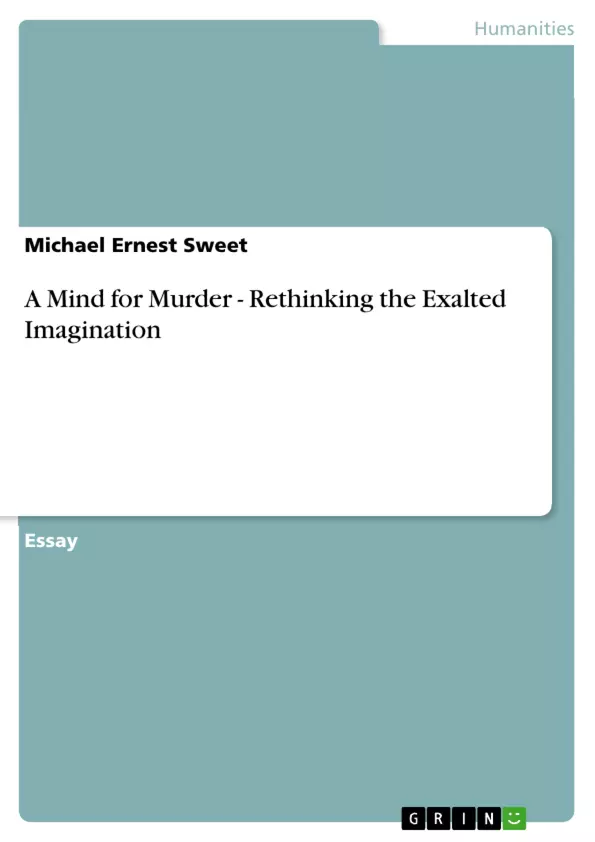Philosophy of Imagination: Understanding Greene and Egan
“My eyes are cameras. My mind is tuned to more television channels than exist in your world. And it suffers no censorship. Through it, I have a world and the universe as my own. So, save your sympathy and know that only a body is in prison. At my will, I walk your streets and am right out there among you.” –Charles Manson (Convicted Cult Leader)
Maxine Greene and Kieran Egan, two prominent educational philosophers, have championed the importance of the imagination in education for decades. Greene (1995, 1998, 2001, 2003) essentially claims that the imagination “allows people to think of things as if they could be otherwise; it is the capacity that allows a looking through the windows of the actual towards alternative realities” (2003, p.63). Egan (personal communication, March 11, 2007) believes the imagination to be central to education because “imagination involves the capacity to be liberated from the constraints of literal and conventional thinking; it gives us the power to conceive of new possibilities”. As we can see, both Greene and Egan share a closely related understanding of why the imagination is important in education; it frees the mind.
In recognition of this shared vision I have partnered these two philosophers and will proceed to examine their thought in tandem insofar as they both project a generally similar view of the benefits of imagination. Not wishing to diminish the very real distinctions in their thought, my examination does centre on where these two scholars converge in relation to their philosophy of imagination. I will refer to their conception as the ‘exalted imagination’, borrowing the term from Maguire (2006) which denotes a modern, highly positive understanding of the faculty which has also collected various aspects of its ontology from the depths of its annals. That is, the modern exalted imagination is not a notion wholly developed in the modern period, rather a conception assembled mainly in the modern period, drawing
from imagination’s far-reaching history1. This understanding; this exalted imagination, is
shared by a number of contemporary scholars (see, for example, Warnock, 1976; White, 1990; Nussbaum, 1995) who have ushered in a modern fascination with the imagination. This, in turn, has lead to a call for more imagination and a claim that imagination is overwhelmingly a good thing. I am suspect of both of these declarations. Regardless, in light
of this there seems to be the emergence of a movement for contemporary educational policy to place imagination, its development, promotion, and general celebration at the top of the heirchiy in terms of organizing themes for school curricula. Maxine Greene and Kieran Egan are two prominent scholars at the fore of such a movement.
In this article I will examine the fundamental claims of Greene and Egan in relation to the exalted imagination, and assess the philosophical foundations upon which they stand. Why should we, as educators, be concerned about Greene and Egan’s claims that modern education is neglecting this most important mental faculty? Does their concept of imagination, as essentially allowing for thought about new possibilities, harmonize with traditional philosophical understandings of the imagination?
Very shortly into an investigation of the philosophical history of imagination, one will find themselves in a quicksand of inconsistency. E.J. Furlong (1961) opens his book on imagination saying that, “A philosopher surveying the territory defined by the term ‘imagination’ finds it a dense and tangled piece of country” (p. 15). Nigel Thomas (1997) intensifies the problem suggesting our sum total of understanding in relation to imagination just doesn’t add up. This echoes Kieran Egan (1992) himself who says, “In the case of imagination, I think this sense of vagueness [in terms of understanding the imagination] is due in part to its complexity but also in part to its containing a number of elements that do not sit comfortably together” (p.9). Then there are those who suggest that we have not even made appropriate attempts towards understanding the imagination; Maguire says, “One receives the force of imagination, but often without sustained examination, like a dark energy that differentiates and expands what is, permitting life and the emergence of worlds, but whose ultimate source and powers are called upon rather than comprehended” (2006, p. 2). Maguire ends with the claim that “there is as yet no answer to the question of what imagination is…” (2006, p. 9).
[...]



